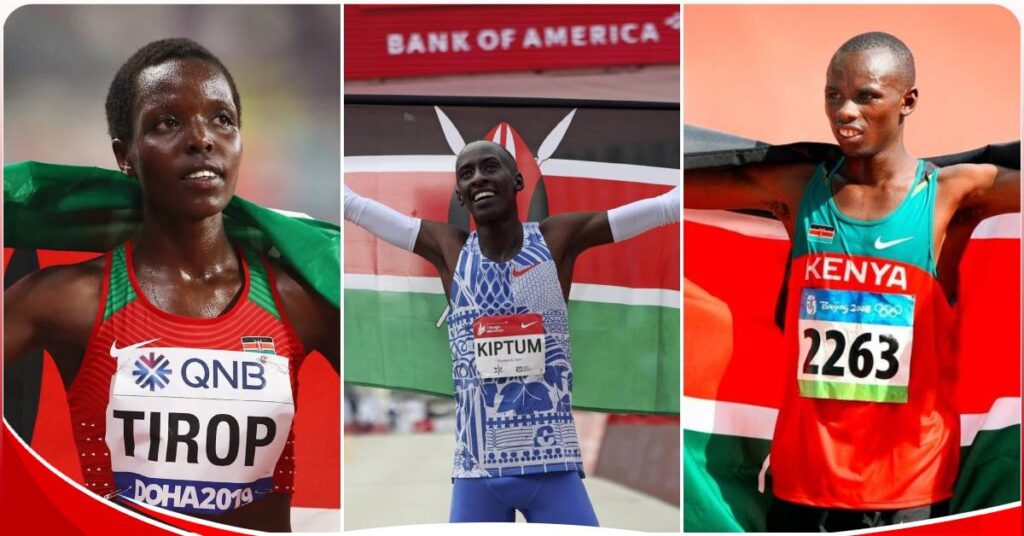The world of athletics is often defined by moments of triumph, resilience, and the pursuit of greatness. Yet for some of Kenya’s most gifted talents, their remarkable journeys ended abruptly at the very moment their stars were burning brightest.
Kenya, long celebrated as a powerhouse in long-distance running, has witnessed athletes who conquered global stages and inspired millions, only for tragedy to silence their promise too soon.
This article looks back at the lives and careers of four legendary Kenyan athletes whose untimely deaths shocked the world and cut short legacies that were still unfolding.
Samuel Wanjiru
Samuel Kamau Wanjiru announced himself to the world with a fearless, front-running victory at the Beijing 2008 Olympic Marathon, delivering Kenya’s first Olympic gold over 42 km and smashing the Olympic Games record.
Read More
His audacious run not only secured his place in history but also reshaped marathon tactics at the championship level, proving that bold pacing from the start could withstand heat, pressure, and elite fields.
He followed his Olympic triumph with dominant wins in major city marathons, including London in 2009 and Chicago the same year, where he set a course record.
In 2010, he returned to Chicago to defend his title in what many still describe as one of the most dramatic marathon duels of modern times, outlasting Ethiopian rival Tsegaye Kebede in searing conditions.
These achievements cemented his status as one of the most exciting marathoners of his generation and confirmed a rapid ascent to the top tier of road running.
The string of victories thrust Wanjiru firmly into the global spotlight. In Kenya, he was celebrated as a national hero and a symbol of the country’s enduring dominance in long-distance running.
His story inspired a new wave of young athletes, and his aggressive racing style earned admiration from fans and analysts alike. At just 24, he appeared destined for a long reign at the summit of world marathon running.
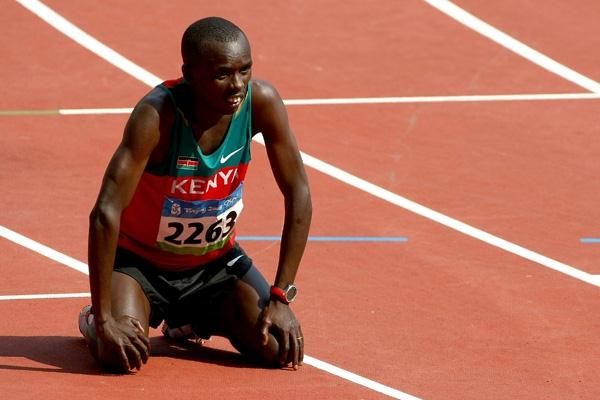
However, on 15 May 2011, tragedy struck. Wanjiru died after a fall from the balcony of his home in Nyahururu, in circumstances that immediately sparked confusion and speculation. Early police reports hinted at foul play, while others suggested possible suicide.
Years of uncertainty followed, as rumours and competing narratives clouded the public’s understanding of what truly happened that night. In 2017, after a long inquest, a Nairobi court finally ruled out both murder and suicide, stating there was no evidence to support either claim and declaring his death accidental.
The ruling closed one of Kenyan sport’s most debated tragedies but left lingering questions about what might have been had Wanjiru lived to fulfil the promise of his talent.
Kelvin Kiptum
In 2023, Kelvin Kiptum produced what many hailed as the most explosive rookie marathon season in history. Barely known outside running circles at the start of the year, he stunned the world by storming to victory at the London Marathon in April, setting a new course record of 2:01:25.
Just five months later, he delivered an even more extraordinary performance in Chicago, crossing the line in 2:00:35. The time made him the first man to run under 2:01 in a ratified race, elevating him instantly to the pinnacle of the sport.
World Athletics officially ratified Kiptum’s mark as the men’s marathon world record on 6 February 2024, displacing the legendary Eliud Kipchoge. At only 24 years old, he was widely seen as the future of marathon running.
Unlike many of his peers, Kiptum raced with fearless consistency, clocking remarkable splits; running faster in the second half of races than the first, a hallmark of his endurance and tactical mastery. His performances suggested he was not only capable of breaking records but of redefining the limits of human endurance.
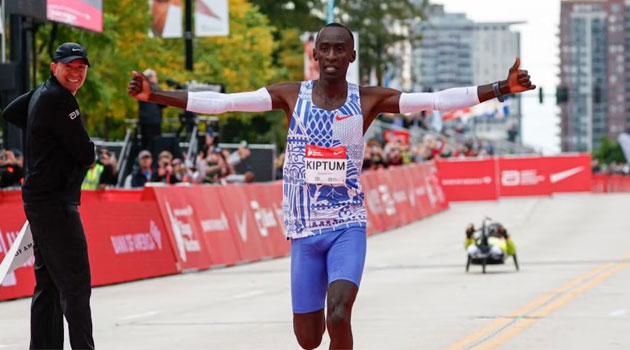
The victories catapulted Kiptum into global stardom. In Kenya, he became an overnight hero, celebrated in villages, towns, and cities as the next great figure to extend the country’s marathon legacy.
He spoke with confidence about chasing a sub-two-hour marathon in open competition, a feat that had previously been achieved only in controlled conditions by Kipchoge.
With youth, fearlessness, and remarkable early success on his side, the athletics world looked to Kiptum as the man to carry the sport into a new era.
That promise was cut short in devastating fashion. On 11 February 2024, just five weeks after his record was ratified, Kiptum died in a road accident near Kaptagat, Eldoret, alongside his coach and mentor, Gervais Hakizimana of Rwanda.
According to police reports, the vehicle they were travelling in veered off the road, struck a tree, and landed in a ditch. A third passenger survived with injuries.
News of his death sent shockwaves across the globe, with tributes pouring in from athletes, sporting bodies, and fans who recognised the scale of what had been lost.
The global reaction underscored how widely Kiptum was regarded as the sport’s next era-defining marathoner. For many, his death carried echoes of past tragedies in Kenyan athletics; another life and career full of promise extinguished at the very moment it seemed destined to change the sport forever.
Nicholas Bett
While Kenya is renowned for its middle- and long-distance dominance, Nicholas Kiplagat Bett carved an entirely new path for the nation. At the 2015 World Championships in Beijing, he stunned the athletics world by winning the men’s 400m hurdles in 48.37 seconds, becoming the first Kenyan ever to secure a global title in a sprint event.
The victory was historic; a breakthrough that shifted global perceptions of Kenyan athletics, showing the country could excel not only in endurance events but also in explosive sprint disciplines.
Bett’s triumph in Beijing capped a remarkable season in which he had steadily risen through the ranks, moving from continental contender to world champion.
His win placed him firmly in the international spotlight and inspired conversations about nurturing more Kenyan talent in the sprints and hurdles.
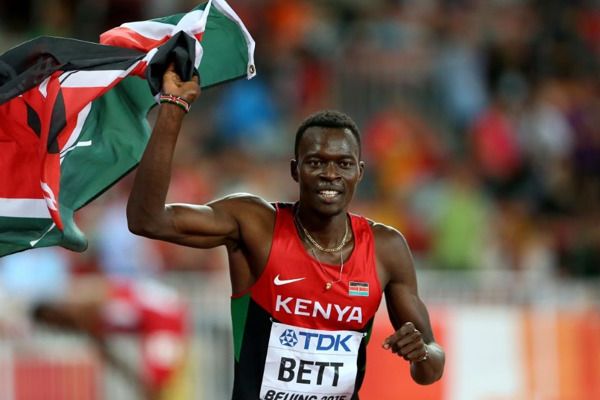
At just 23 years old, Bett was heralded as the face of a new frontier in Kenyan track and field, carrying the hopes of a nation proud to see its colours flying in events far from the marathon and 10,000m.
In the years that followed, Bett remained a key figure in the 400m hurdles, competing at the 2016 Rio Olympics and continuing to represent Kenya on the Diamond League circuit. Although injuries disrupted his momentum, he was determined to recapture the heights of 2015, and his presence on the track symbolised Kenya’s expanding footprint in world athletics.
Tragedy struck on 8 August 2018, just days after returning from the African Championships in Asaba, Nigeria. Bett died in a car crash in Nandi County when the vehicle he was driving veered off the road and rolled.
He was 28 years old. News of his passing shocked the athletics community, both at home and abroad, cutting short a career that had promised to redefine Kenya’s sprint identity
Agnes Tirop
Agnes Jebet Tirop rose rapidly through the athletics ranks, announcing herself as one of Kenya’s brightest talents of her generation.
In 2015, aged just 19, she won gold at the World Cross Country Championships in Guiyang, China, becoming one of the youngest women in history to capture the senior title. That breakthrough signalled the arrival of a prodigy whose range spanned surfaces and distances.
On the track, Tirop continued to deliver at the highest level. She won bronze in the 10,000m at both the 2017 World Championships in London and the 2019 edition in Doha, consistently demonstrating her ability to challenge the very best in tactical, championship racing.
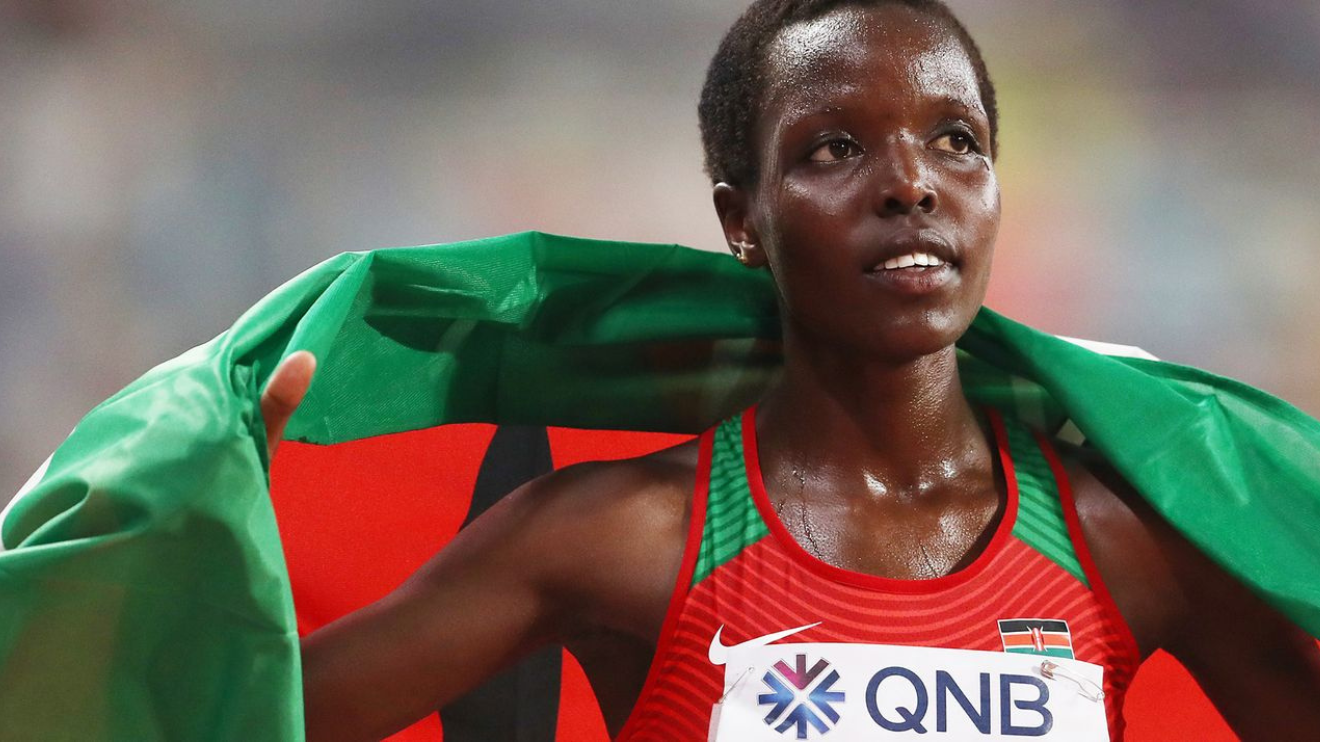
At the delayed Tokyo 2020 Olympics, she narrowly missed a medal in the 5000m, finishing fourth in a highly competitive field, a result that confirmed her standing among the world’s elite.
Her versatility extended onto the roads. In September 2021, Tirop set a new women-only 10km world record of 30:01 at the Road to Records meeting in Herzogenaurach, Germany; a performance ratified by World Athletics and recognised by Guinness World Records.
The feat underlined her adaptability across cross country, track, and road racing, and positioned her as a figure set to dominate long-distance running for years to come.
Just weeks later, tragedy struck. In October 2021, Tirop was found dead at her home in Iten with stab wounds. Her husband, Ibrahim Rotich, was subsequently charged with her murder, and court proceedings have continued amid close public scrutiny.
Her death sent shockwaves through the athletics world, coming at a time when she appeared poised to achieve even greater success. In the aftermath, fellow athletes, friends and supporters launched Tirop’s Angels, a foundation and movement campaigning against gender-based violence.
Based in Iten, the initiative established a resource centre to provide support, advocacy and education, ensuring that Tirop’s legacy extends beyond sport into social change.
